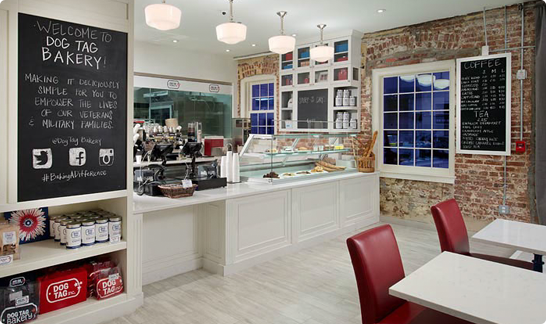Student Perspective: SiriusXM “Dollars and Change” Recap, Week of July 2
Wharton Social Impact Fellow Petra Nichols spent a portion of her summer fellowship in the studio with us, tuning in to a live recording of “Dollars and Change,” SiriusXM’s only show devoted to social impact and business. Listeners can hear WSII on the radio every Thursday morning from 8-10 a.m. ET, or streaming online all week.

In advance of Fourth of July weekend, the hosts of SiriusXM’s “Dollars and Change” broadcast a themed show featuring topics about veteran services, national economic development, and an American favorite — sports.
Hosts Nick Ashburn and Jacob Gray led with two interviews surrounding organizations preparing veterans and athletes for the transition to “normal” civilian life. The morning’s first segment featured Meghan Ogilvie, the founder and CEO of Dog Tag Inc., which owns Dog Tag Bakery in Georgetown, D.C.
Informed by her military background, Meghan understands the struggles veterans face when transitioning to civilian life, especially those experiencing physical, emotional, and mental challenges. In her bakery, cookies and brownies are more than just comfort food – they’re also part of a valuable work experience.
In a partnership with Georgetown University’s Center for Continuing and Professional Education (CCPE), veterans spend a six-month paid fellowship working at the bakery, gaining civilian job skills, and studying to receive a Certificate in Business Administration.
Through their courses and employment at the bakery, “the veterans learn the process of product innovation, accounting, customer relations, and managing a business,” says Ogilvie. She believes that this experiential learning program helps prepare vets for a successful post-service career, whether in a corporate environment or their own entrepreneurial venture.
The following segment focused on the United Service Organizations’ Transition 360 Alliance, which partners with leading NGOs to help military personnel and their families transition back to civilian life after their service ends. USO President and CEO Dr. J.D. Crouch II shared insights into the unique needs of veterans, and the ways NGOs can help them develop a new career path, strengthen community networks, and plan for the future.
“The military is a life of separation – from people you love, from things you love,” Crouch says. The USO helps to ease that separation through initiatives that provide support for the injured and their caregivers, transition aid, and even entertainment and internet access for deployed troops. As of now, the Alliance partners with four NGOs, including Rally Point/6, which employs a community integration model that connects veterans to all relevant resources in their community, from employment to housing.
Crouch estimated that one million service members will transition out of the military in the next five years, and will face hurdles in restarting their careers. By using best practices from the leading NGOs in the field, the USO eases service members’ reintegration with American society.
The third segment hosted Evan Burfield, co-founder and co-CEO of 1776, a global incubator and seed fund helping startups “transform industries that impact millions of lives every day — in education, energy & sustainability, health, transportation and cities.
“No industry has a greater impact on individuals’ abilities to succeed in it than education, and we need to radically rethink every aspect of how we teach and learn,” says the company. 1776 filters out the best models from an overabundance of startups in the education sector, helping these “best-in-breeds” navigate the system and aiding stakeholders in making smart investments.
“Cities want to attract start ups and millenials, but they’re using very old school approaches to economic development,” Burfield says. Washington, D.C. exemplifies this phenomenon with, “very tightly knit networks like K Street and government contractors, but none of them are really talking to each other.” However, he added, that communication happens naturally in major innovation hubs like San Francisco.
To address this issue, 1776 hosted a series of round-table discussions in cities countrywide to create a road map for startup-friendly cities. After successfully expanding their strategies to major U.S. cities, 1776 next looks to create a global layer of startup incubators; Evan calls it, “innovation that matters: part two.”
Our final guest, Deborah Slaner Larkin, is the CEO of the Women’s Sports Foundation, an organization which “serves as a collective voice for women in sports.”
The WSF serves women through all stages of their athletic careers, from elementary school children to professional athletes seeking retirement.
Three in five girls in America do not participate in sports — and that number rises among minorities, those living in rural areas and inner cities, and those afflicted by obesity and other chronic diseases.
That means a large population of girl aren’tbenefitting from the, “confirmed significant health, academic, and leadership benefits from sports,” Larkin says.
WSF works to close that gap. This fall WSF will host its first Athlete Leadership Connection, a summit for athletes transitioning from athletic to professional careers.
“[The conference is] our own version of ‘Shark Tank’ – athletes looking at cases and presenting cases to our own version of ‘sharks,’ which are angel investors,” says Larkin. Female athletes make strong employees, she says,because they learn what it means to “work hard, to take criticism well, get up every day and keep going,” as proven leaders and high achievers.
Through WSF, Larkin’s ultimate goal is for women in and out of sports to be respected as equals.
In all, these organizations provide support systems for entrepreneurs and corporate career seekers, especially those fighting stigmas and injuries in the job market. I stepped into the world of entrepreneurial veterans and female athletes for two short hours during Thursday’s radio show, which I kept in mind while watching the Color Guard present in Philadelphia and while cheering on the U.S. during the Women’s World Cup this Independence Day weekend.
 Petra Nichols, C’16, is a rising senior majoring in International Relations and Hispanic Studies at Penn. As an Investing in Women Fellow at WSII, she researches ways that impact investing furthers development by focusing on women’s empowerment.
Petra Nichols, C’16, is a rising senior majoring in International Relations and Hispanic Studies at Penn. As an Investing in Women Fellow at WSII, she researches ways that impact investing furthers development by focusing on women’s empowerment.


